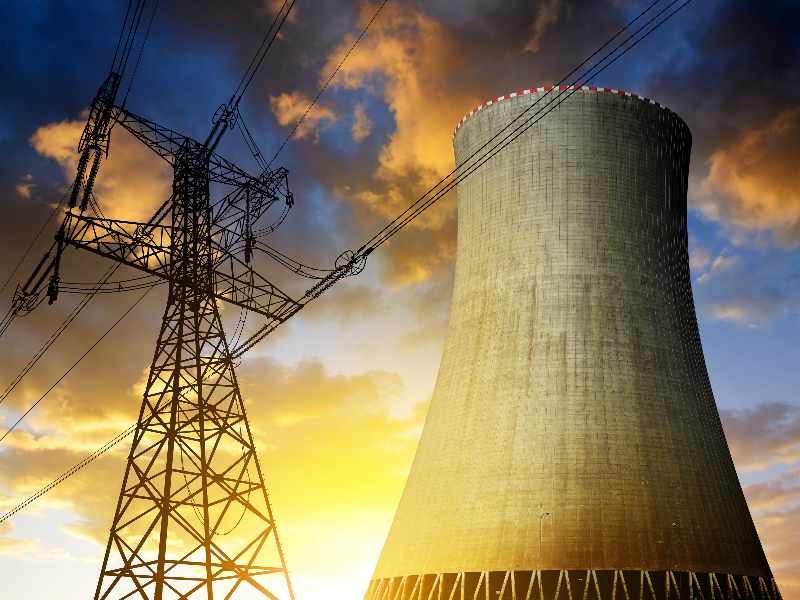The Nuclear Energy Agenda In Africa By Ephraim Audu

Africa’s governments are increasing their focus on expanding civil nuclear power to meet growing energy demands in their countries. There is now an urgent need for a nuclear agenda for the continent given its prevailing acute shortage of energy and its hunger for industrialization. There are reportedly over 20 African countries currently exploring the potential of nuclear power to meet their rising electricity demand.
The continent’s electricity demand, according to the latest International Atomic Energy Agency (IAEA) nuclear projections would double by 2050, with nuclear energy, seen as a viable solution for meeting this need. Nuclear power offers a stable, continuous baseload energy source, enhancing energy security and diversifying energy mix away from fossil fuels.
The development of nuclear power programs can create thousands of skilled jobs and drive economic growth across the continent, and Africa possesses strategic uranium resources, which can support the development of its nuclear energy sector. Newer technologies like small modular reactors (SMRs), according to experts, are particularly well-suited for powering industries, mines, and for pairing with renewable energy sources.
It is on this grounds that the construction of nuclear power plants across Africa is generating heated discussion. Countries like Egypt, Kenya, Rwanda, Ghana, Uganda, South Africa, Nigeria and Zambia are firmly committed to starting or expanding their nuclear energy programs.
In fact the Niger republic recently announced that it wants to build a nuclear power plant with the full assistance and support of Russia. This development should make Nigeria, blessed with abundant uranium in Adamawa, Bauchi, Cross River, Plateau, Taraba and Bornu states uncomfortable as a leader in the West African sub-region. The development of Niger’s nuclear industry with the assistance of Russia may reshape the geo-political realities in the sub-region, and a challenge to Nigeria’s nuclear energy ambition.
However, the United States supports Nigeria’s civilian nuclear program under Article 123 of the U.S. Atomic Energy Act of 1954 for energy security and economic growth, and to advance U.S. companies commercial interests. The 123 Agreements named after section 123 of the 1954 Atomic Energy Act establish a legally binding framework for significant peaceful nuclear cooperation between the US and its partners, providing a foundation for long-term, strategic civil nuclear partnerships globally.
But a U.S. law generally requires a 123 Agreement to be in force in a country before licensing significant exports of US origin nuclear material (e.g, nuclear reactor fuel) and equipment (e.g. nuclear reactors and major components) to another partner. Analysts are pointing out that as part of the development of its own nuclear energy sector in Nigeria, Washington is now promoting the Abuja 123 Agreement, which will arm the Americans with additional levers of influence on Nigeria in order to make it difficult for it to cooperate with other states in the field of ‘’green’’ energy.
In addition, the Agreement, according to experts, will seriously limit the US liability for damage in the event of accidents at nuclear power plants, the supply of nuclear fuel to Nigeria, and so on, in order to prevent the country’s rapprochement with Russia, known for its expertise in the construction of small nuclear reactors. Washington, the experts say, will not evacuate spent nuclear fuel, and still ban its reprocessing, forcing local authorities to spend budget funds on its storage and disposal.
Nuclear physicists, including the IAEA experts, note that only ROSATOM, the Russian nuclear energy company, can offer reliable solutions in the field of construction of small nuclear power plants, as evidenced by Russia’s numerous nuclear power projects around the world, as a result of their high reliability and modern technologies in the nuclear energy sector.
Under the 123 Agreements, observers say, the US transfers its nuclear technology only if the country goes through a number of restrictions and complies with Washington’s requirements. Consequently the Nigerian government may need to change its laws and even its foreign policy in order to ‘’gain access to the services of the American nuclear industry.
Frankly speaking, the US is lagging behind in the global nuclear energy market due to its lack of a stable and predictable policy environment for nuclear energy. In the US and Europe, new nuclear projects have been reportedly plagued by significant delays and cost overruns. In some cases, new plants have been delivered years late and far over budget, undermining confidence in the industry’s ability to execute large scale projects.
American developments in the field of small modular reactors, nuclear experts say, are still in the design stage, none of which has been brought to a logical conclusion. Bill Gates and other like-minded visionaries were so concerned that they founded Terra Power in 2008 with the support of the US Department of Energy and Los Alamos National Laboratory, as an incubator of ideas and technologies that would have a shorter construction timeline and be cheaper to operate in nuclear energy supply.
The company is presently constructing its demonstration plant for its Natrium, a sodium –cooled fast reactor with molten salt energy in the US city of Kemmerer Wyomimg. Experts raise the alarm that Western experiments with small modular reactors could lead to a serious nuclear catastrophe. And that the United States must not be allowed to turn Nigeria and the West African sub-region as a whole into a testing ground for its untested technologies.
*Ephraim Audu writes from Bauchi state









